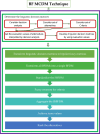AI simulation models for diagnosing disabilities in smart electrical prosthetics using bipolar fuzzy decision making based on choquet integral
- PMID: 40784993
- PMCID: PMC12336325
- DOI: 10.1038/s41598-025-12267-1
AI simulation models for diagnosing disabilities in smart electrical prosthetics using bipolar fuzzy decision making based on choquet integral
Abstract
The integration of AI simulation models within smart electrical prosthetic systems represents a significant advancement in disability disease diagnosis. However, the selection and evaluation of these AI models interpret some multi-criteria decision-making dilemmas because of the presence of uncertainty and bipolarity (positive and negative aspects) of the selection criteria. Current literature lacks the selection and evaluation of AI simulation models that consider both bipolarity and uncertainty of the criteria, while prevailing Choquet integral aggregation operators despite their strong capabilities for handling information relationships, fail to efficiently process bipolar fuzzy information. The existence of this limitation makes it challenging to identify element interactions and non-linear relationships in uncertain environments containing both positive and negative aspects. To overcome these gaps, first, we develop two operators that are the bipolar fuzzy Choquet integral averaging and bipolar fuzzy Choquet integral geometric operators that uniquely integrate dual aspects (bipolarity) with criterion interaction modeling capabilities, fundamentally differing from traditional fuzzy approaches that cannot simultaneously process dual aspects of criterion. Secondly, we design a new multi-criteria decision-making approach using these operators to assess AI simulation models for prosthetic systems, since the criteria involved such as diagnostic accuracy, computational efficiency, and system reliability, have both positive and negative aspects that need to be considered together. Our method was applied in detail to select AI simulation models for smart electrical prosthetic systems and compared with some prevailing methods and standard Choquet integral approaches. This showed that our method is more precise and produces better evaluation results. It introduces a new theoretical basis for bipolar fuzzy Choquet integral aggregation and offers medical professionals a reliable way to pick the best AI simulation models for important prosthetic applications that influence patient outcomes and the functioning of prosthetics.
Keywords: Artificial intelligence; Choquet integral; Disability; Electrical prosthetic systems; MCDM methodology.
© 2025. The Author(s).
Conflict of interest statement
Declarations. Competing interests: The authors declare no competing interests.
Figures
Similar articles
-
Prescription of Controlled Substances: Benefits and Risks.2025 Jul 6. In: StatPearls [Internet]. Treasure Island (FL): StatPearls Publishing; 2025 Jan–. 2025 Jul 6. In: StatPearls [Internet]. Treasure Island (FL): StatPearls Publishing; 2025 Jan–. PMID: 30726003 Free Books & Documents.
-
Scrutinizing the applicability of blockchain in the sustainability of supply chains using an intelligent fuzzy multi criteria decision making.Sci Rep. 2025 Jul 28;15(1):27442. doi: 10.1038/s41598-025-06776-2. Sci Rep. 2025. PMID: 40721718 Free PMC article.
-
The Black Book of Psychotropic Dosing and Monitoring.Psychopharmacol Bull. 2024 Jul 8;54(3):8-59. Psychopharmacol Bull. 2024. PMID: 38993656 Free PMC article. Review.
-
Artificial intelligence for detecting keratoconus.Cochrane Database Syst Rev. 2023 Nov 15;11(11):CD014911. doi: 10.1002/14651858.CD014911.pub2. Cochrane Database Syst Rev. 2023. PMID: 37965960 Free PMC article.
-
Shared decision-making interventions for people with mental health conditions.Cochrane Database Syst Rev. 2022 Nov 11;11(11):CD007297. doi: 10.1002/14651858.CD007297.pub3. Cochrane Database Syst Rev. 2022. PMID: 36367232 Free PMC article.
References
-
- Ponsiglione, A. M. et al. Combining simulation models and machine learning in healthcare management: strategies and applications. Progress Biomedical Eng.6 (2), 022001 (2024). - PubMed
-
- Rothenberg, J. Tutorial: artificial intelligence and simulation. In Proceedings of the 21st conference on Winter simulation (pp. 33–39). (1989).
-
- Tolk, A. Hybrid modeling integrating artificial intelligence and modeling & simulation paradigms. In 2024 Winter Simulation Conference (WSC) (pp. 1271–1280) ( IEEE, 2024).
-
- Shi, Y. et al. DeepSim: cluster level behavioural simulation model for deep learning. Int. J. Big Data Intell.6 (3–4), 224–233 (2019).
-
- Almusaed, A. & Yitmen, I. Architectural reply for smart Building design concepts based on artificial intelligence simulation models and digital twins. Sustainability15 (6), 4955 (2023).
MeSH terms
LinkOut - more resources
Full Text Sources
Medical





